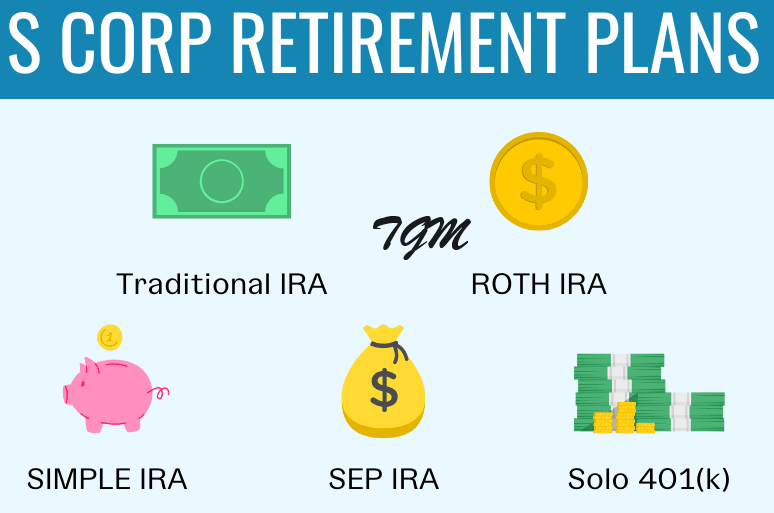A vital part of managing finances is saving for retirement, which may be particularly difficult for independent contractors. Freelancers often struggle to file their taxes effectively and optimize their tax savings since they work as independent contractors. Freelancers may minimize their tax obligations while increasing their wealth for the future by taking advantage of S-corporations’ advantages. The benefits of S-corporations for retirement planning and the resources available to independent contractors to properly file their taxes will be discussed in this article.
Maximizing Retirement Savings for Freelancers through S-Corporation and Solo 401(k) Plans
401(k) and other employer-sponsored retirement plans are not available to freelancers, in contrast to regular workers. They are now exclusively in charge of laying away money for their future, which might make retirement savings more challenging. Freelancers may create a retirement plan that provides substantial 1099 tax benefits by establishing an S-corporation.
Forming a Solo 401(k) plan is one of the main advantages of being an S-corporation. Freelancers might potentially double their contribution limitations under this retirement plan by contributing as both an employer and an employee. For 2021, the highest allowable contribution to a Solo 401(k) is $58,000 for those under 50 and $64,500 for people over 50. Freelancers may save a significant sum of money for the future and lower their IRS taxable income by using this retirement plan.
Optimizing Tax Savings for Freelancers:
Reducing self-employment taxes is another benefit of becoming an S-corporation, and a self-employment tax calculator can help with this. Self-employment taxes, which include the employer and employee components of Social Security and Medicare taxes, are due by independent contractors. However, independent contractors may pay themselves a fair wage and give out dividends from their leftover earnings by setting up their company as an S-corporation. Dividends may result in tax savings since they are not subject to self-employment taxes, unlike the pay, which is.
Freelancers need precise computations of their income and tax obligations in order to prepare for retirement and optimize tax savings. Thankfully, they have a number of tools at their disposal to help them with this process. One such resource that assists independent contractors in assessing the financial effects of switching from being an employee to an independent contractor is the W2 vs. 1099 calculator. Freelancers may evaluate the tax consequences of working for themselves vs working for others by entering their income, deductions, and other pertinent data.Streamlining Freelancers’ Finances:
Furthermore, independent contractors may precisely calculate their self-employment tax due by using a self-employment tax calculator. To calculate how much self-employment tax a freelancer owes, this calculator considers their income, deductions, and other pertinent information. Freelancers may more efficiently manage their finances and make sure they are putting away the money they need for retirement by being aware of their tax requirements.
Additionally, freelancers find that projected tax calculators are quite helpful in planning and calculating their quarterly expected tax payments. Since taxes are not deducted from freelancers’ earnings all year long, they must submit anticipated tax payments to the IRS on a quarterly basis. Based on their anticipated revenue and deductions, these calculators assist independent contractors in figuring out how much they should pay each quarter. Freelancers may make sure they are fulfilling their tax responsibilities and prevent underpayment penalties by precisely predicting their tax payments.
Conclusion
To sum up, the absence of employer-sponsored retirement plans and the intricacies of self-employment taxes make retirement planning difficult for independent contractors. On the other hand, independent contractors may reduce their self-employment taxes and benefit from retirement programs like the Solo 401(k) by setting up an S-corporation. Furthermore, self-employed tax calculators, W2 vs. 1099 calculators, and anticipated tax calculators are useful resources for freelancers who need to precisely compute their taxes and make financial plans. Freelancers may safeguard their financial future and accumulate money for retirement by putting these tactics into practice and making the most of the instruments at their disposal.
Are you ready to take control of your financial future and secure your retirement? Look no further than S-corporations, the secret weapon for creating wealth and building a solid foundation for your golden years. In this blog post, we will explore how utilizing S-corporations in your retirement planning can set you on the path towards financial freedom and abundance. Get ready to pave the way for a prosperous future with our expert insights and tips on maximizing the benefits of S-corporations for long-term wealth creation.



